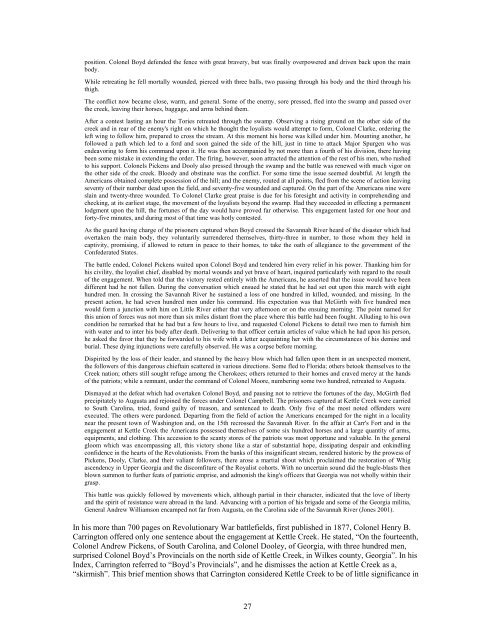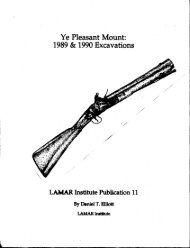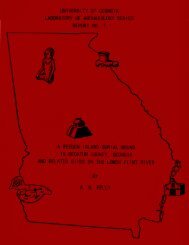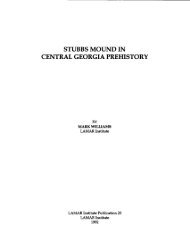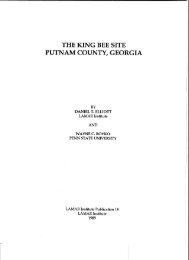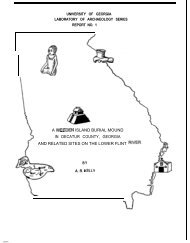Stirring Up a Hornet's Nest: - UGA Laboratory of Archaeology ...
Stirring Up a Hornet's Nest: - UGA Laboratory of Archaeology ...
Stirring Up a Hornet's Nest: - UGA Laboratory of Archaeology ...
Create successful ePaper yourself
Turn your PDF publications into a flip-book with our unique Google optimized e-Paper software.
position. Colonel Boyd defended the fence with great bravery, but was finally overpowered and driven back upon the main<br />
body.<br />
While retreating he fell mortally wounded, pierced with three balls, two passing through his body and the third through his<br />
thigh.<br />
The conflict now became close, warm, and general. Some <strong>of</strong> the enemy, sore pressed, fled into the swamp and passed over<br />
the creek, leaving their horses, baggage, and arms behind them.<br />
After a contest lasting an hour the Tories retreated through the swamp. Observing a rising ground on the other side <strong>of</strong> the<br />
creek and in rear <strong>of</strong> the enemy's right on which he thought the loyalists would attempt to form, Colonel Clarke, ordering the<br />
left wing to follow him, prepared to cross the stream. At this moment his horse was killed under him. Mounting another, he<br />
followed a path which led to a ford and soon gained the side <strong>of</strong> the hill, just in time to attack Major Spurgen who was<br />
endeavoring to form his command upon it. He was then accompanied by not more than a fourth <strong>of</strong> his division, there having<br />
been some mistake in extending the order. The firing, however, soon attracted the attention <strong>of</strong> the rest <strong>of</strong> his men, who rushed<br />
to his support. Colonels Pickens and Dooly also pressed through the swamp and the battle was renewed with much vigor on<br />
the other side <strong>of</strong> the creek. Bloody and obstinate was the conflict. For some time the issue seemed doubtful. At length the<br />
Americans obtained complete possession <strong>of</strong> the hill; and the enemy, routed at all points, fled from the scene <strong>of</strong> action leaving<br />
seventy <strong>of</strong> their number dead upon the field, and seventy-five wounded and captured. On the part <strong>of</strong> the Americans nine were<br />
slain and twenty-three wounded. To Colonel Clarke great praise is due for his foresight and activity in comprehending and<br />
checking, at its earliest stage, the movement <strong>of</strong> the loyalists beyond the swamp. Had they succeeded in effecting a permanent<br />
lodgment upon the hill, the fortunes <strong>of</strong> the day would have proved far otherwise. This engagement lasted for one hour and<br />
forty-five minutes, and during most <strong>of</strong> that time was hotly contested.<br />
As the guard having charge <strong>of</strong> the prisoners captured when Boyd crossed the Savannah River heard <strong>of</strong> the disaster which had<br />
overtaken the main body, they voluntarily surrendered themselves, thirty-three in number, to those whom they held in<br />
captivity, promising, if allowed to return in peace to their homes, to take the oath <strong>of</strong> allegiance to the government <strong>of</strong> the<br />
Confederated States.<br />
The battle ended, Colonel Pickens waited upon Colonel Boyd and tendered him every relief in his power. Thanking him for<br />
his civility, the loyalist chief, disabled by mortal wounds and yet brave <strong>of</strong> heart, inquired particularly with regard to the result<br />
<strong>of</strong> the engagement. When told that the victory rested entirely with the Americans, he asserted that the issue would have been<br />
different had he not fallen. During the conversation which ensued he stated that he had set out upon this march with eight<br />
hundred men. In crossing the Savannah River he sustained a loss <strong>of</strong> one hundred in killed, wounded, and missing. In the<br />
present action, he had seven hundred men under his command. His expectation was that McGirth with five hundred men<br />
would form a junction with him on Little River either that very afternoon or on the ensuing morning. The point named for<br />
this union <strong>of</strong> forces was not more than six miles distant from the place where this battle had been fought. Alluding to his own<br />
condition he remarked that he had but a few hours to live, and requested Colonel Pickens to detail two men to furnish him<br />
with water and to inter his body after death. Delivering to that <strong>of</strong>ficer certain articles <strong>of</strong> value which he had upon his person,<br />
he asked the favor that they be forwarded to his wife with a letter acquainting her with the circumstances <strong>of</strong> his demise and<br />
burial. These dying injunctions were carefully observed. He was a corpse before morning.<br />
Dispirited by the loss <strong>of</strong> their leader, and stunned by the heavy blow which had fallen upon them in an unexpected moment,<br />
the followers <strong>of</strong> this dangerous chieftain scattered in various directions. Some fled to Florida; others betook themselves to the<br />
Creek nation; others still sought refuge among the Cherokees; others returned to their homes and craved mercy at the hands<br />
<strong>of</strong> the patriots; while a remnant, under the command <strong>of</strong> Colonel Moore, numbering some two hundred, retreated to Augusta.<br />
Dismayed at the defeat which had overtaken Colonel Boyd, and pausing not to retrieve the fortunes <strong>of</strong> the day, McGirth fled<br />
precipitately to Augusta and rejoined the forces under Colonel Campbell. The prisoners captured at Kettle Creek were carried<br />
to South Carolina, tried, found guilty <strong>of</strong> treason, and sentenced to death. Only five <strong>of</strong> the most noted <strong>of</strong>fenders were<br />
executed. The others were pardoned. Departing from the field <strong>of</strong> action the Americans encamped for the night in a locality<br />
near the present town <strong>of</strong> Washington and, on the 15th recrossed the Savannah River. In the affair at Carr's Fort and in the<br />
engagement at Kettle Creek the Americans possessed themselves <strong>of</strong> some six hundred horses and a large quantity <strong>of</strong> arms,<br />
equipments, and clothing. This accession to the scanty stores <strong>of</strong> the patriots was most opportune and valuable. In the general<br />
gloom which was encompassing all, this victory shone like a star <strong>of</strong> substantial hope, dissipating despair and enkindling<br />
confidence in the hearts <strong>of</strong> the Revolutionists. From the banks <strong>of</strong> this insignificant stream, rendered historic by the prowess <strong>of</strong><br />
Pickens, Dooly, Clarke, and their valiant followers, there arose a martial shout which proclaimed the restoration <strong>of</strong> Whig<br />
ascendency in <strong>Up</strong>per Georgia and the discomfiture <strong>of</strong> the Royalist cohorts. With no uncertain sound did the bugle-blasts then<br />
blown summon to further feats <strong>of</strong> patriotic emprise, and admonish the king's <strong>of</strong>ficers that Georgia was not wholly within their<br />
grasp.<br />
This battle was quickly followed by movements which, although partial in their character, indicated that the love <strong>of</strong> liberty<br />
and the spirit <strong>of</strong> resistance were abroad in the land. Advancing with a portion <strong>of</strong> his brigade and some <strong>of</strong> the Georgia militia,<br />
General Andrew Williamson encamped not far from Augusta, on the Carolina side <strong>of</strong> the Savannah River (Jones 2001).<br />
In his more than 700 pages on Revolutionary War battlefields, first published in 1877, Colonel Henry B.<br />
Carrington <strong>of</strong>fered only one sentence about the engagement at Kettle Creek. He stated, “On the fourteenth,<br />
Colonel Andrew Pickens, <strong>of</strong> South Carolina, and Colonel Dooley, <strong>of</strong> Georgia, with three hundred men,<br />
surprised Colonel Boyd’s Provincials on the north side <strong>of</strong> Kettle Creek, in Wilkes county, Georgia”. In his<br />
Index, Carrington referred to “Boyd’s Provincials”, and he dismisses the action at Kettle Creek as a,<br />
“skirmish”. This brief mention shows that Carrington considered Kettle Creek to be <strong>of</strong> little significance in<br />
27


